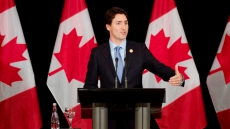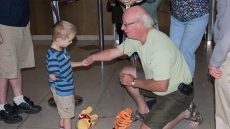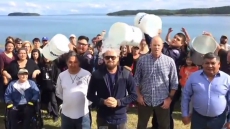EDMONTON — Canada's national Inuit organization is calling for the Edmonton Eskimos football team to change its name. So what does the word really mean?
Many historians believe the origin of Eskimo comes from an Algonquin term meaning "eaters of raw meat."
And it wasn't used in a nice way, says Niigaan Sinclair, head of the native studies department at the University of Manitoba.
When Europeans first settled in North America, they asked different aboriginal tribes what others were called, Sinclair explains. That included pointing at a group of northern dwellers who ate flesh from seals and whales.
"So the Europeans come in and they're talking to the Cree and say: 'Who are those people?'" Sinclair says.
"'Oh those? Those are the meat-eaters over there.'"
There are other theories.
An expert with the Smithsonian Institution has proposed that Eskimo actually comes from another aboriginal term that refers to people wearing snowshoes.
Despite the label, the group continued to call themselves Inuit, which means "the people" in Inuktitut. They'd already been using it for hundreds of years, says Sinclair.
In the 1970s, others started to listen. At the first Inuit Circumpolar Conference in Alaska, delegates agreed the term Inuit should be used instead. Some tribes in Alaska and Siberia continue to identify as Eskimo.
"Nobody uses Eskimo in Canada anymore — at all," says Sinclair.
The word remains on some food items, such as Eskimo Pie ice-cream bars, although Nestle says it doesn't sell the treats in Canada. Similar banana-shaped bars are called Eskimo Monkeys in Thailand. In New Zealand, Eskimos are a popular type of marshmallow candy. In 2009, an Inuit woman from Canada who travelled in New Zealand made headlines when she called the sweets racist.
Sinclair is Anishinabe — not Ojibwa, a term that was also placed on his people, he says.
He remembers watching football as he was growing up and how his father was offended by the Edmonton Eskimos.
"He'd be saying, 'Well, that's not an appropriate name for a football team.'"
Sinclair says the term is disrespectful and should no longer be the name of the team.
"It's not easy to divorce ourselves from these terms, but history will eventually rid ourselves of these racially inappropriate, misdescribing names."
A LOOK AT SOME OF THE RECENT ETHNIC MASCOT CONTROVERSIES IN CANADA

EDMONTON — Canada's national Inuit organization wants Edmonton's Canadian Football League team to stop using the name Eskimos. There's been vigorous debate over the use of ethnic mascots, particularly aboriginal-themed ones, for sports teams.
Perhaps the biggest controversy swirls around the Washington Redskins in the National Football League. In the U.S., Adidas has announced it will help high schools who want to change their mascot by offering free design resources and financial support. Here's a look at some of the Canadian teams that have made the switch:
January 2014: The Ottawa-area Nepean Redskins youth football, which had the same logo and colours as the Washington NFL team, changed its name to the Nepean Eagles after a human rights complaint.
June 2014: Western Canada High School in Calgary dropped its Redmen name and logo after consulting with school board elders and despite opposition to the change. It cost the board $200,000 to repaint the gym and order new uniforms. The new name is the Redhawks.
November 2014: The Prince Albert Raiders of the Western Hockey League stopped using a mascot that depicted an Arabian raider character holding a sword and a hockey stick. The team said the mascot was modelled after the logo it used when the team won the Memorial Cup in 1985, but there were complaints it stereotyped Middle Eastern people.
December 2014: Regina's Balfour Collegiate changed its team name to the Bears form the Redmen in December 2014.
December 2014: Bedford Road Collegiate in Saskatoon switched to Redhawks from the Redmen. Officials said while the origin of the Redmen name was innocuous, there had been feedback suggesting it was no longer appropriate.




